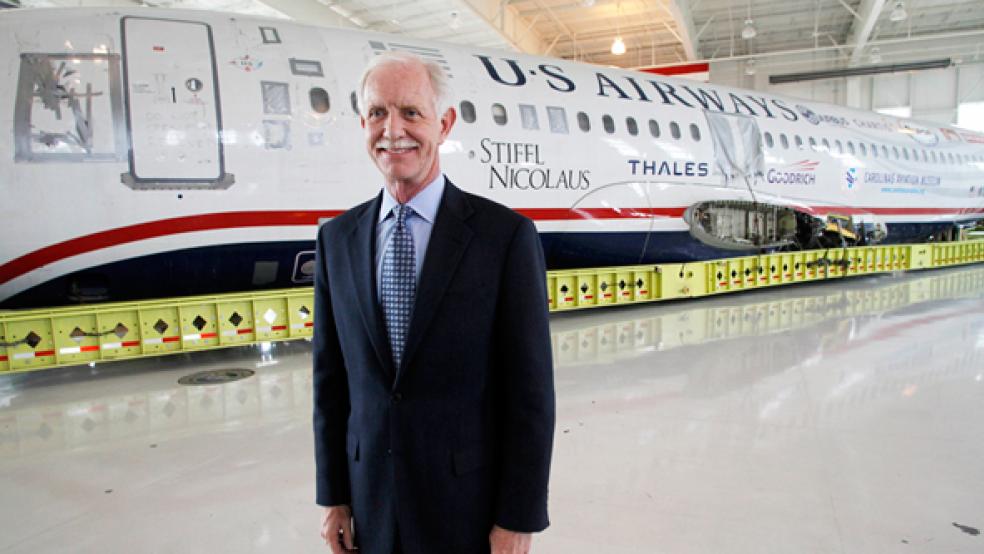Chesley “Sully” Sullenberger, the pilot who safely landed U.S. Airways Flight 1549 in the Hudson River in January 2009, saving all 155 lives on board and instantly becoming a national hero, has a message for Congress in May 2012: Break out of your Beltway bubble. You can’t afford not to, during a time of economic and fiscal hardship.
“Most Americans right now are looking to their leaders to create jobs," said Sullenberger in an exclusive interview as his new book was about to go on sale. “Instead, the debate in Washington seems to be all about cutting government services. Leaders have cut themselves off from the very people who elected them and instead exist in the ‘echo chamber’ inside the Beltway.” This error can be costly, he suggests – in a number of ways.
Sullenberger, 61, is known mostly for his dramatic Hudson River rescue – a feat that cheered millions – but as a veteran of the aviation industry and an experienced management consultant, “Sully” goes far deeper than that. He has over 40 years of flying experience in both commercial and military aviation, is a graduate of the U.S. Air Force Academy, and holds masters degrees from Purdue and the University of Northern Colorado. He's run teams within organizations for many years and has seen change from the inside out. In 2007 he founded Safety Reliability Methods, Inc., a management safety and performance consulting company whose clients include Dupont. And he has written two books, including the just-released Making a Difference: Stories of Vision and Courage from America’s Leaders.
Sullenberger also singles out highly paid CEOs who have cut corporate costs while granting themselves big bonuses and stock options even when their companies perform poorly. “I think pay should be connected to performance. And our top executives are no exception.”
Great leaders can affect big change, “but part of being an effective leader means making clear that we’re all in this together,” he said. “When a select few have great power and, through their relationships with the boards, are able to completely insulate themselves from the consequences of their decisions, it’s clear that their interests are not for a cause greater than themselves but for personal gain. That makes for a corrosive culture, and it’s got to change.”
The Fiscal Times (TFT): You say there’s a cost associated with having a negative corporate culture. How so?
Chesley Sullenberger (CS): Some CEOs have said publicly, “There’s no economic benefit to having happy employees." The people who adhere to that, whether they really believe it or are just saying it, pay a huge price. But it’s often a hidden price: They’re not accounting for it. There’s a cost associated with not having a real partnership between management and labor, a cost associated with not having an engaged, innovative workforce. You lose good people; you miss productivity targets.
RELATED: Declining Employee Loyalty: Red Flag for Business
TFT: In your chapter on John Bogle of Vanguard, the two of you discuss the great disparity between the one percent and the 99 percent, which is the reason so many Americans feel disenfranchised. How do you suggest we fix this?
CS: People have to change the way they think. That’s one of the first things boards can do: Tie pay to performance. When we get these high multiples, it’s counterproductive. The committees may claim that’s what it takes to attract the best talent, but I don’t believe it.
TFT: Why isn’t money the best way to motivate the rank and file?
CS: When people come to work, they really want to do a good job. They want to be successful. They want to be in an environment where what they do matters. And when you acknowledge that, people will more than meet you halfway. Each of us can make the effort, the time, to do that.
TFT: Which political leaders today, in your view, can bring about some of the changes you suggest are critical for this country? Mitt Romney? President Obama?
CS: This book is not a political book. But each of us has a responsibility to ourselves, to each other, to our nation, to society, to be engaged and involved, to educate ourselves, to choose people we think will do the same. We’ve got to vote; we’ve got to be engaged. And we’ve got to change the way our political campaigns are financed. Especially in light of Citizens United, the Supreme Court decision that made Super PACs and unlimited corporate donations possible. That kind of money creates access tolegislators and rulemakers that essentially disenfranchises the rest of us. Until that stops, until we change the game to align the incentives that lean toward more public good, it’s going to be very difficult for people to be effective leaders.
TFT: Why did you include Michelle Rhee in your book as an example of strong leadership? When she was the schools chancellor in Washington, she was certainly a polarizing figure in many ways, as you suggest.
CS: She’s now running Students First, the not-for-profit advocacy organization for education reform. She knows the ‘why’ of what she does. She knows that holding children to the highest standards is in the best interests of our students, who deserve the best possible education, and of this country. It’s not about maximizing the pay and privileges of tenured teachers, but of educating our kids. She told me, ‘There’s no way we’re going to have a higher quality education system that’s focused on kids and their academic growth if we essentially tell kids to suck it up with a bad teacher because it’s about that teacher’s employment rights. That’s crazy!’


